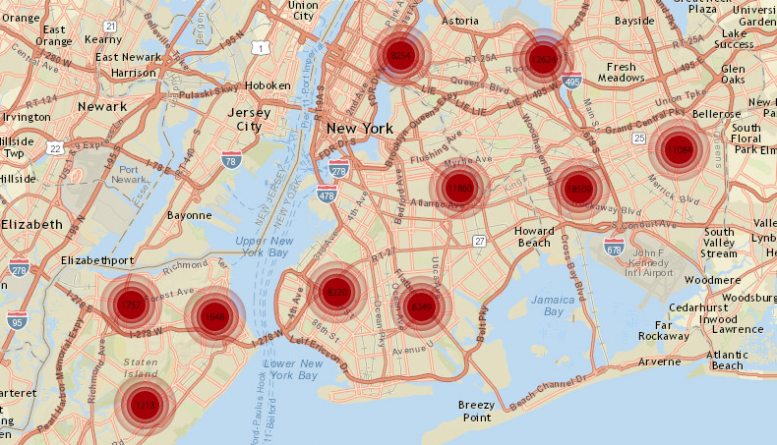YIMBY used the city’s Open Data portal to map the last five years of 311 complaints about illegal conversions, and the numbers illustrate what longtime New Yorkers already know: the majority of illegal apartments occupy homes in densely populated, working class areas with growing numbers of recent immigrants.
While the mayor grapples with his goal of creating and preserving 200,000 units of affordable housing, de Blasio hasn’t looked at how to legalize illegal basement apartments, which offer lower-cost housing to renters throughout the city.
Tenants in these neighborhoods—Elmhurst, Jamaica, Woodside, Sunset Park and Mott Haven—are some of the most rent-burdened, and live in more crowded apartments, on average, than people in any other part of the city, according to the Furman Center. To top it all off, they sometimes end up living in unregulated units that lack basic fire safety measures, like smoke detectors, sprinklers, or a second exit.
And these renters have no legal recourse if a landlord decides to evict them, or if the Department of Buildings decides to slap a vacate order on the door. Of course, property owners often wait for the DOB to force out their tenants, so they don’t have to buy them out or take the case to housing court.
So how can the city solve this problem? Well, it could punish property owners by charging them $15,000 for every illegal apartment, or building and city planning officials could revise housing laws to make it cheaper and quicker for home owners to upgrade their illegal units.
Landlords who want to legalize conversions and basement apartments have to undergo a lengthy and sometimes expensive process with the Department of Buildings, leading many owners to simply accept their apartments’ illegal status. Property taxes also increase substantially when buildings go from three units to four, offering further incentive for homeowners to dodge legalization.
Mortgage appraisers often take basement apartments into account when assessing a property’s value, meaning that home owners are paying for those units, even if they aren’t rented out.
Thanks to a housing code written to prevent overcrowded slums in the early 20th century, it’s illegal to rent out the cellar of a one- or two-family home. Similarly, renting out the basement of a small house requires costly upgrades, a new certificate of occupancy, and months of dealing with the DOB’s labyrinthine bureaucracy.
If the city can approve some fairly simple changes to the zoning and building codes, the DOB could use its $120 million in extra funding to educate homeowners and hire inspectors to enforce the new rules about legalized basement apartments.
In a brief published last year, South Asian non-profit Chhaya Community Development Corporation suggests that the city create an “accessory dwelling unit” program, which would encourage the legalization of safe apartments that are technically forbidden by the zoning code.
Renters would benefit from valuable safety measures and better light and air, and the city would be able to collect taxes on an estimated 114,000 illegal basement units. Chhaya also wants the state to alter the existing J-51 tax abatement program, set to expire in June along with 421-a. Home owners could upgrade their basement apartments, which would become rent-stabilized, and in exchange, they would receive a break on their property taxes for up to 34 years.
Now, it’s up to the mayor and his administration to make good on his campaign promise from 2013, when he wanted illegal basements and “granny flats” to become rent-stabilized. We hope it won’t take another tragic fire for the city to realize how important this could be for both landlords and renters.
Subscribe to YIMBY’s daily e-mail
Follow YIMBYgram for real-time photo updates
Like YIMBY on Facebook
Follow YIMBY’s Twitter for the latest in YIMBYnews


It is disingenuous in the writing of this article to be calling illegally converted homes “affordable”. Because the city is not enforcing the zoning laws, one and two family homes are being converted into multiple dwellings and SRO’s in which ONE room is priced as a market rate apartment. These SRO’s house many more people that the occupancy of the house was intended. Strangers live with families and steel doors that are locked from within are what separates the residents. Even with a new law in place to make basement apartments legal, most of these offenders would not follow the code because it would never be enforced. The city will not use their right to inspect an apartment and the perpetrators will continue to reap the rewards. It sounds so simple to just change the rules to create new legal and affordable basement apartments, but the code was written to “… to prevent overcrowded slums in the early 20th century,…” and what do we have now because this code has no enforcement? Overcrowded slums. There were also tenant laws written at the same time to protect the residents of these over crowded slums and again, because of the lack of enforcement, these tenants are not granted these rights. Your reporters need to get out into the field and see what is really happening in the city. Before DeBlasio can fulfill his campaign promise to make “illegal basements” and granny flats into rent-stabilized units he first has to make sure these apartments can be inspected to make sure the residents are both protected and not exploited. Charging a hefty fee for each illegal apartment is one of the better ideas because it puts the onus on the property owner to follow the laws. Again without enforcement, this means nothing.